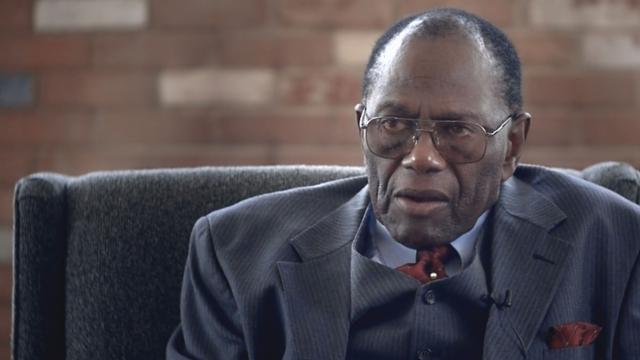
In the Jim Crow South, John Stokes led a strike that helped bring about an end to segregation.
When John Stokes entered wartime military service in 1952, he was no stranger to conflict. He’d already taken an audacious stand for justice in his hometown a year before.
In 1951, Stokes was the 19-year-old president of Robert Russa Moton High School’s senior class in rural Prince Edward County, Va. That year, he and a handful of student leaders led their classmates in a strike to bring attention to their substandard school. Now, six decades later, Stokes recalls those formative years and how he knew, after standing up to entrenched segregationists, that he’d lead a life of service.
Stokes, like black students all over the Jim Crow South, was painfully aware of the double standard dividing communities at the time. While his white neighbors attended schools with all the modern conveniences, his was a ramshackle complex of brick and tar-paper buildings hastily cobbled together, so inadequate that students used umbrellas inside when it rained.
In April 1951, after weeks of secret planning by a small, select committee of student organizers that included Stokes, all of the school’s 450 students refused to attend classes until the school board committed to construction of a new building.
Local segregationists didn’t take too kindly to this affront, and a palpable tension settled over Prince Edward County in the days that followed.
Black officials were fired from their jobs or found that they couldn’t conduct business as usual. Stokes’ family would turn out the lights when they heard their dog barking at night for fear it might be someone intent on doing them harm.
Someone burned a cross on school grounds. “There were targets on our back,” Stokes says. “For a long time I was a marked man for organizing this strike, and some people didn’t let go of that easily.”
The students’ strike caught the attention of Virginia’s NAACP, which decided to sue the Prince Edward County School Board, contending that sending blacks and whites to separate schools was unconstitutional. Within a few weeks, Stokes and his classmates returned to school with a new and powerful ally on their side. Two years later, NAACP lawyers combined the Prince Edward County lawsuit with four similar cases and argued them before the Supreme Court in Brown v. Board of
Education, which famously outlawed the long-standing “separate but equal” doctrine in U.S. schools.
Meanwhile, Stokes had continued his education until his nation came calling. He was drafted and went to basic training at Fort Belvoir, Va., in 1952. He was already familiar with military service; his three brothers and one of his sisters served in
World War II, including one as a driver with the famed Red Ball Express. “Even as a teenager I saw the irony of a country that required service of people the law regarded as second-class citizens,” Stokes says.
He was nervous about the possibility of being sent to Korea, but he approached his new calling with the commitment that had seen him through the challenging days of high school. During boot camp, Stokes drew on the discipline, courage and leadership that had helped him stand up to Prince Edward County’s school board. On his second day, the drill instructor made him a squad leader.
Alas, Stokes’ eyesight – which he says was passable but not great – handicapped his ability on the shooting range, keeping him from being sent to Korea. He served with the 9829th Technical Service Unit at Fort Belvoir, eventually attaining the rank of corporal.
He never told anyone in the Army what he’d done in high school. Four years earlier, President Harry Truman had signed Executive Order 9981, integrating the armed forces. Stokes was encouraged by efforts to desegregate the Army, but still saw vestiges of its divided past. Stokes’ unit, Company B of the 9829th, was all-black despite Truman’s order. At basic training, one recruit had been told so often that blacks shouldn’t handle weaponry that he wet himself when a drill instructor handed him a gun. Another time, while traveling through Tennessee tracking down AWOL soldiers, Stokes and another black soldier nearly had their military-issued .45s confiscated by an overzealous small-town sheriff, incredulous that the pair had been given weapons.
Stokes eventually left the military to pursue college, but says his service left a lasting impression on him. “It’s hard for some people to understand this, but I think all young adults should be required to serve in the military. It would teach them the respect and discipline that are lacking today.”
After college, Stokes had a long and distinguished career in education as a teacher and principal. Retirement didn’t slow him, though. He penned a book – “Students on Strike: Jim Crow, Civil Rights, Brown, and Me” – about his experiences as a young man. In 2008, the state of Virginia unveiled a monument honoring local civil rights leaders at its Capitol, and his likeness is included among the 18 statues.
Stokes continues to lecture to groups about his experiences in the segregated South and during wartime. “I’ll continue as long as God gives me strength,” he says.
Ben Swenson is a freelance writer living in Williamsburg, Va.
- Magazine

